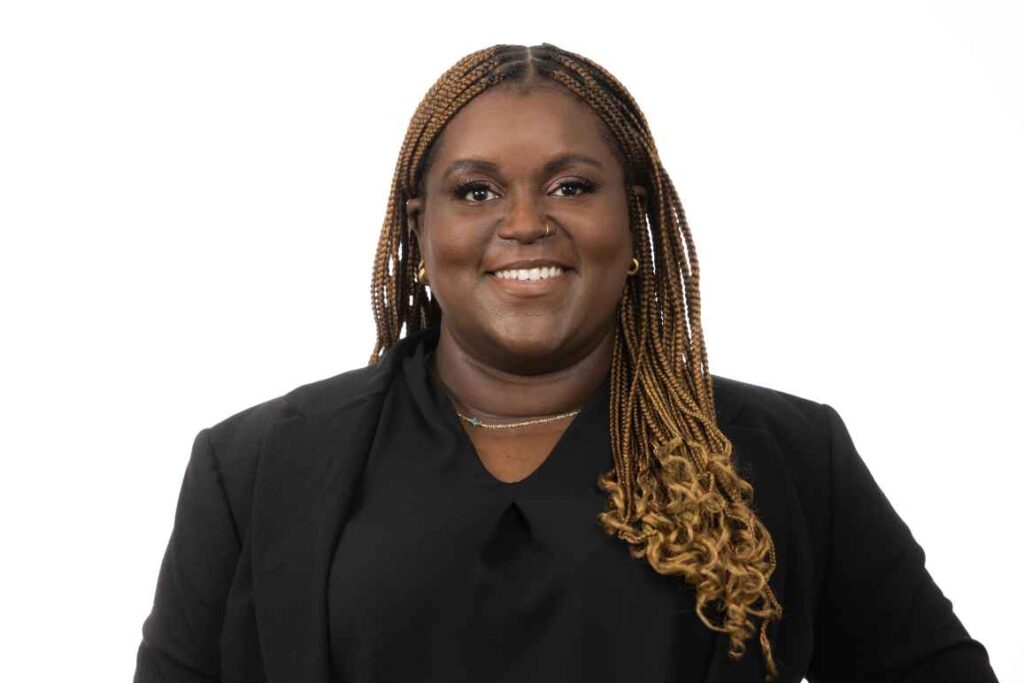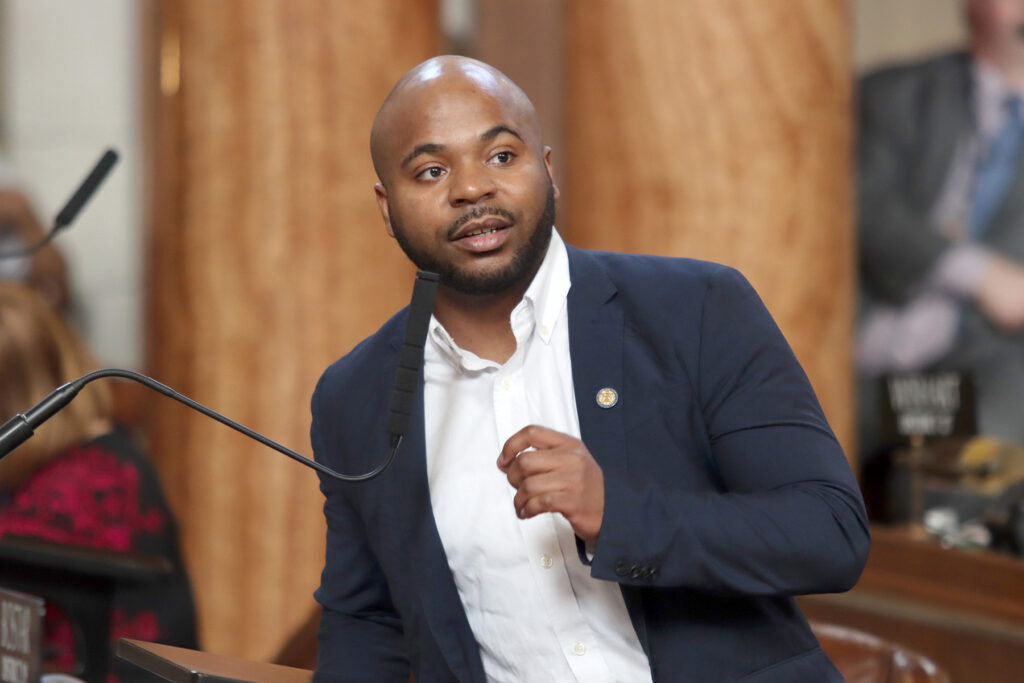Omaha police officer Jeffrey Vaughn stepped onto the shoulder of Interstate 80 near Gretna on a mild June 2020 day. He had just pulled over MeShelle Settles in her silver Chevrolet Malibu for following another car too closely, Vaughn later wrote on a warning citation. As the stop progressed, Vaughn asked Settles to step out of her car.
According to Vaughn, Settles’ 20-year-old son also tried to get out, ignoring his instructions to stay inside. Vaughn drew his gun.
Settles believes the officer pulled her over, searched her car and held her son at gunpoint for 5 to 10 minutes for one reason.
She and her son are Black.
That’s what Settles alleged in a complaint to the Omaha Police Department. The department didn’t agree, according to documents provided by Settles’ lawyer.
That conclusion is not unique.
Sixty-three times in the past decade, a citizen had made a formal complaint to the police department alleging they were the victim of biased policing or discrimination during an encounter with an OPD officer.
Sixty-three times, the department dismissed the case, never siding with the complainant, according to data obtained by Flatwater Free Press through a public records request.
Police officials argue that this statistic reflects the Omaha Police Department’s good work in preventing biased policing. But experts, including a former U.S. Justice Department leader, doubt that claim, suggesting that many police departments aren’t good at investigating bias, particularly when there’s no independent oversight.
While police didn’t side with Settles in her complaint, the City of Omaha did pay her $42,500 to settle a lawsuit she later filed. It’s one of four settlements, totaling roughly $700,000, that the city has paid out in cases where police bias or discrimination played some part in the allegations.
Settles didn’t want to talk about the roadside stop, or whether the settlement felt like vindication after OPD dismissed her complaint, when reached by the Flatwater Free Press.
“It was a traumatic experience that I don’t want to relive,” she wrote in an email.
In a written response, OPD Deputy Chief Anna Colón outlined the steps the department takes to prevent biased or discriminatory policing.
During investigations, body-worn cameras provide clear evidence, “erasing any doubt about what occurred,” she wrote. Each officer also undergoes two hours of annual anti-bias training. The department analyzes traffic stops and complaint trends. These checks and balances set the Omaha Police Department apart from other agencies, Colon wrote.
“The (Omaha Police Department) takes great strides, starting with the hiring process, to weed out those candidates who display characteristics or tendencies to be biased or discriminatory, all the way to retirement,” Colón wrote.

Colón also noted that all bias complaints are sent to the Nebraska Crime Commission. But that commission only looks at bias complaints when a police department believes misconduct has occurred and an officer’s certification would be reviewed, said Bryan Tuma, the crime commission’s executive director. Tuma said to his knowledge the commission has never done that.
The crime commission has tracked allegations of racial profiling since 2002. The commission logged 251 such complaints from across the state during a two-decade span ending in 2022, the most recent data. Five resulted in discipline.
The Omaha Police Department has also not disciplined any officers for bias or discrimination through its internal detection system, according to Lt. Neal Bonacci, a spokesperson for the department.
That track record doesn’t surprise Christy Lopez, a former deputy chief with the U.S. Department of Justice who led the investigation and reform negotiations in Ferguson, Missouri, following the 2014 police killing of Michael Brown.

Police departments are generally “really not good” at investigating discriminatory policing, she said. It’s very common to have such complaints “essentially dismissed from the outset.”
Bias is hard to prove, she said. It’s also a complicated subject that departments often don’t thoroughly investigate.
“It’s always been my sense that there’s much more misconduct going on than the public knows about any given department,” she said. Some departments are fine, but “there’s no way to know for sure that your department is one of those.”
While the Omaha Police Department hasn’t sided with a citizen who formally complained of bias or discrimination in the past decade, the city has settled four lawsuits that contained bias or discrimination allegations in that time frame.
The city settled Settles’ lawsuit only because it no longer had evidence refuting Settles’ claim, said deputy city attorney Bernard in den Bosch. The police cruiser footage was not preserved despite timely legal requests to do so, he said.
“The city was concerned that its failure to retain the video would lead the Court to instructing a jury to infer that the video was destroyed in order to cover up misconduct,” in den Bosch wrote.
More than $500,000 went to the family of Zachary Bear Heels, a Native American man who suffered from mental illness. He died after Omaha police punched and stunned him multiple times in 2017. Three officers were fired but later reinstated following Bear Heels’ death. A fourth fired officer was charged with second-degree assault but later acquitted.
The settlements also include a 2013 arrest of Octavius Johnson over a parking issue in which officers slammed him to the ground, chased his brother through their home and knocked their aunt from her wheelchair, according to the suit. The department fired six officers over Johnson’s arrest. Two were later reinstated. A third resigned, Bonnaci said. The discipline in the Bear Heels and Johnson cases appears to have originated from internal investigations, according to media reports at the time. It’s not known whether citizen complaints for bias or discrimination were filed in those cases.

Joy Kathurima, legal and policy counsel with the ACLU of Nebraska, said the police department reviewing a decade’s worth of bias complaints and dismissing all of them doesn’t make statistical sense given Omaha’s population and the size of its police force.
“It’s not that I think Omaha police are doing a bad job … but there’s a lot of factors you have to consider about whether or not that number is an accurate representation of how regular Omaha residents feel about their police department,” Kathurima said.
The Omaha Police Department has received 2,240 citizen complaints total in the past decade, about 19% of which they “sustained” or agreed with, according to Flatwater Free Press analysis of the data.
When police sustain complaints, the most common next step is to do a job performance interview – making a record of the misconduct but not disciplining the officer – or a verbal policy review. In addition, 42 officers received written reprimands, 29 were suspended, one was removed from their unit and three retired before facing discipline.
But the department rarely sustained citizen complaints alleging an excessive use of police force, and never sustained a complaint regarding the 63 allegations of bias or discrimination.
An audit could show whether the 63 complaints is an accurate count and evaluate the efficacy of the investigations, said Seth Stoughton, a University of South Carolina law professor and expert in police misconduct.
Omaha once had a public safety auditor who reviewed complaints. Mayor Mike Fahey fired the last auditor in 2006 for releasing an unauthorized report that raised concerns over Omaha police officers conduct in traffic stops involving minorities as well as the handling of related complaints.

“Firing the public safety auditor after getting information that they didn’t like is the classic ‘Bang your head on the wall’ (moment),” Stoughton said. “The auditor’s job is to help identify information that may prove problematic so you can fix the problem.”
In 2014, Mayor Jean Stothert created the Citizen Complaint Review Board, which reviews appealed complaints. Community advocates have criticized the group for having little power and hearing few complaints.
“That board is a joke,” said Ben Salazar, an advocate in Omaha’s Latino community who said the lack of strong oversight hampers trust that complaints will be taken seriously.
The state also has a racial profiling committee tasked with overseeing annual traffic stop trends as well as racial profiling allegations and policies across Nebraska.
But that state committee has been inactive for years, Tuma said. The last posted meeting for the group: May 2021. Gov. Pete Ricketts last appointed members to the board in 2022, including Jasmine Conrad Moseley, a communications strategist for the ACLU of Nebraska. Emailed questions about the committee sent to Gov. Jim Pillen’s office were not answered.

Conrad Moseley said her excitement about the appointment turned to disappointment with the lack of meetings. The next thing she heard about the committee was through a bill in the Legislature’s last session that aimed, but failed, to eliminate it.
“We need oversight and we have the opportunity to do that,” she said. “We just need to get a meeting scheduled.”
Independent oversight is important, Stoughton said, but more importantly departments need good policy defining bias as well as effective tools to weed it out. Hiring officers who display no bias is unrealistic, he said.
“Do you not hire an officer who has an implicit bias because they have an implicit bias?” Stoughton asked. “If that’s true, you’re not hiring anyone ever.”
Anti-bias training has been shown to have an effect. Researchers at Washington State University found it led to a 50% reduction in discrimination-based complaints and 5% improvement on performance reviews in a study of 50 Sacramento police officers.
Omaha’s police department has also become more diverse. Its nearly 1,000 employees closely mirror Omaha’s own demographics, though white people are still overrepresented. It’s also gotten national attention for efforts like Omaha 360, a weekly meeting where community members can talk to high-ranking officers, including Chief Todd Schmaderer. The model is being adopted in Kansas City. Requests to speak to leaders of Omaha 360 were not returned.
Willie Hamilton, founder of the advocacy group Black Men United, said police-community relationships have improved under Schmaderer, who’s been in his position since 2012. But he said biased policing, or at least the fear of it, still exists.
“When I get into North Omaha I see police on every second or third corner,” he said. “It’s stressful. I’m worried about my two sons who may get pulled over, may get shot, murdered, whatever the case may be. I just wish we’d have deeper conversations about this issue that’s been going on for years.”
State Sen. Terrell McKinney, who has introduced legislation to establish stronger police oversight, said he wasn’t surprised by the FFP analysis of complaint data.
“I think the problem is bigger than that,” he said of the 63 bias and discrimination complaints. “A lot of people don’t know how to make a complaint or don’t feel comfortable making a complaint because they fear possible retaliation or something from the police.”

Donette Briggs said she tried filing a complaint in the summer of 2023.
Briggs said she called police then to help her nephew and son who had been shot by their aunt during an argument. Briggs said the police initially jumped to conclusions that it was a gang-related shooting, despite her family’s story. She said officers treated her differently because of the color of her skin and the fact she lived in North Omaha.
“Being biased is when you don’t do your investigation and just go to one side,” she said. “They looked at us and thought we (were) gangbangers. Clearly that’s not what the situation was.”
When she went to Omaha’s police headquarters to file a complaint, Briggs said she got the run-around, being directed to different phone numbers and offices before getting frustrated and giving up. She doesn’t remember being told the complaint form and its instructions are available on the city’s website.
Bonacci said there’s no reason why this should have happened. When someone wants to make a complaint they are given a form and no questions are asked about the incident, he said.
Briggs had little trust for the police before last summer. The response to the shooting solidified her feelings. She said, after the incident, that her children are learning to distrust police, too.
“She’s scared of them,” Briggs said of her 12-year-old daughter. “She does not like the police. She don’t want to talk to them. She don’t want nothing to do with them.”




1 Comment
This seems to be the standard operating process for Nebraska Government agencies. Torts against Nebraska agencies filed by citizens do not receive recommendations on status and the state refuses to answer questions on status of torts. If a citizen files a Tort a citizen should receive a response not told to discuss only thru an attorney.